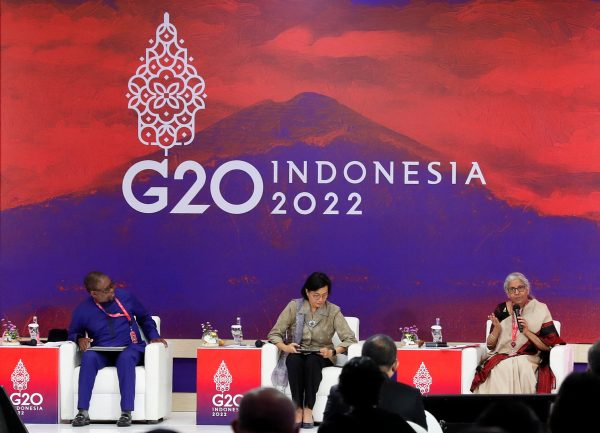With the dust yet to settle from the COVID-19 pandemic, Indonesia is having to recalibrate the agenda of its G20 presidency. The war in Ukraine has stoked rising food, energy and fertiliser prices — all global shocks to which the G20 must respond.
The grouping must contend with the likelihood that US–China relations will regress after the Speaker of US House of Representatives Nancy Pelosi’s visit to Taiwan. Indonesia must work even harder during its G20 presidency to untangle this geopolitical snafu.
Indonesia chaired the second G20 Foreign Ministers Meeting and the third Finance Ministers and Central Bank Governors Meeting of its presidency in July 2022. While no joint communiqué was produced, Indonesia certainly delivered in its leadership. Despite heightened tensions over the Russia–Ukraine conflict, all G20 members attended the meetings. This shows the trust G20 countries place in Indonesia as an impartial chair thanks to its longstanding non-aligned foreign policy.
In the G20 Foreign Ministers Meeting, nations discussed strengthening multilateralism and addressing the global food and energy crises. Indonesia also held 23 bilateral meetings as part of the agenda. The G20 Finance Ministers and Central Bank Governors meeting delivered 12 negotiated paragraphs.
Significant agreements were made on issues ranging from the establishment of the Financial Intermediary Fund for Pandemic Prevention, Preparedness and Response to better manage future pandemics, and the OECD–G20 International Tax package to improve the global tax system. But the meeting failed to produce an agreement on two paragraphs relating to the impact of the war in Ukraine. This meant that a Chair’s Summary was released instead of a joint communiqué.
Indonesia is working to deliver concrete outcomes under the three priority agenda for its G20 presidency — global health infrastructure, inclusive digital transformation and energy transition. Indonesia is now also focussed on addressing failing global food supply chains. Achieving global cooperation on food security would be a major achievement for the G20. Cooperation could include setting up global and regional food buffers, encouraging countries to be transparent about their national food reserves and even the signing of a global food treaty.
As low-hanging fruit, the G20 could build on and strengthen existing mechanisms, such as the Agriculture Market Information System launched during the 2011 G20 presidency. The G20 could similarly coordinate with the UN Crisis Response Group and Global Agriculture and Food Security Program to assist those countries that face dire food shortages when large-scale conflict occurs.
The G20 could also address the scarring effects of the COVID-19 pandemic — such as the disruption to all levels of education and weaker physical capital accumulation by corporations — which could drag down potential for long-term economic growth.
G20 members might also help restructure the sovereign debt of less developed and low-income countries by working through the G20 Debt Service Suspension Initiative and the Common Framework for Debt Treatment. Debt restructuring could help less developed and low-income countries avert debt distress and defaults amid the economic impact of inflation and the pandemic.
The G20 could also address digital transformation challenges like the exploitation of personal data, data stewardship, cybersecurity, the digital divide in access to and utilisation of the internet and concentrated markets in this network economy. These challenges must be addressed through proper international standards, norms and principles before it is too late to bend the moral arc of digital transformation towards the good. The digital transformation should be more visible in economic statistics, like productivity and employment, to better understand its economic effects.
A Roadmap Toward a Common Framework for Measuring the Digital Economy, delivered under the Saudi Arabian G20 presidency in 2020, provided an agreed definition of the digital economy and a set of indicators for measuring jobs, skills and growth within the sector. The roadmap needs to be extended to measure not only the size of the digital sector but also the effects of digital transformation, including its effects on inequality, the environment, political stability, and consumer psychology.
Above all, Indonesia’s G20 presidency has the potential to restore confidence in multilateralism. Its presidency could help protect the institutions that support multilateralism by addressing institutional sclerosis in the World Trade Organization, reforming international financial institutions like the IMF and World Bank and revamping the international monetary system. The G20 should be a convenor for sustained and structural reforms to global governance.
To keep the G20 relevant, times of crisis should serve as a wake-up call to address underlying structural issues and avoid a repeat of health or economic crises. G20 members should continue to discuss topics of common interest and eschew being hijacked by any individual member’s agenda.
Ambassador Triansyah Djani, Indonesia’s G20 Co-Sherpa warns that ‘if the G20 breaks up, everybody will go unilateral. We want to make sure that the G20 remains intact and continues to be the premier forum for international economic cooperation that is able to respond to global economic challenges’.
India, which holds the 2023 G20 presidency, will be the next host tasked with promulgating the consensus-based principles and rules of the G20 to preserve its unity and existence.
Maria Monica Wihardja is an Economist and Visiting Fellow in the Indonesia Studies Programme and the Regional Economic Studies Programme at the ISEAS–Yusof Ishak Institute, Singapore.


Thanks for an informative analysis which provided some specific areas where progress might be made. One thing is not noted, however: how can negotiations about some issues take place with the war in Ukraine going on? Can Russia with its ally China even engage with the USA, European countries, Japan, Australia, Canada, et al? This conflict is the proverbial ‘elephant in the room.’